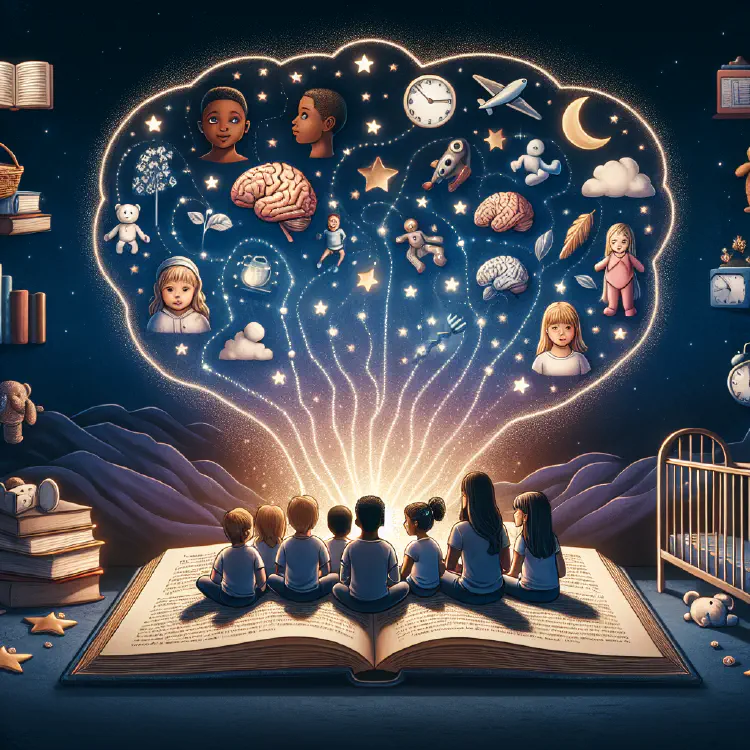The Science Behind Sleep and Children's Development
Sleep science impacts children's development, affecting growth, learning, and well-being. Consistent bedtime routines and age-appropriate sleep durations are crucial for optimal child development.
- 4 min read

As parents, we all know the importance of a good night’s sleep for our children. But have you ever wondered about the science behind sleep and how it affects your child’s development? In this comprehensive guide, we’ll explore the fascinating world of sleep science and its impact on children’s growth, learning, and overall well-being. We’ll also discuss practical tips for establishing healthy sleep habits, including the power of bedtime stories and other relaxation techniques.
The Basics of Sleep Science
Before we dive into the specifics of children’s sleep, let’s start with a brief overview of sleep science. Sleep is a complex biological process that involves various stages and cycles. The two main types of sleep are:
Non-Rapid Eye Movement (NREM) sleep: This consists of three stages, ranging from light sleep to deep sleep.
Rapid Eye Movement (REM) sleep: This is the stage where most dreaming occurs and is crucial for cognitive function and memory consolidation.
Throughout the night, we cycle through these stages multiple times, with each cycle lasting about 90-120 minutes in adults. For children, these cycles can be shorter, especially in infants and young toddlers.
The Importance of Sleep for Children’s Development
Sleep plays a vital role in children’s physical, cognitive, and emotional development. Here are some key areas where sleep has a significant impact:
Physical Growth: During sleep, the body releases growth hormones that are essential for proper physical development. This is particularly important for infants and young children who are growing rapidly.
Brain Development: Sleep helps consolidate memories and process information learned during the day. This is crucial for cognitive development and learning.
Emotional Regulation: Adequate sleep is essential for emotional well-being and helps children better manage their feelings and behavior.
Immune Function: Sleep supports a healthy immune system, helping children fight off illnesses and recover more quickly when they do get sick.
Attention and Focus: Well-rested children are better able to concentrate and perform well in school and other activities.
Sleep Needs by Age
The amount of sleep a child needs varies depending on their age. Here’s a general guide to sleep requirements for different age groups:
- Newborns (0-3 months): 14-17 hours per day
- Infants (4-11 months): 12-15 hours per day
- Toddlers (1-2 years): 11-14 hours per day
- Preschoolers (3-5 years): 10-13 hours per day
- School-age children (6-13 years): 9-11 hours per day
- Teenagers (14-17 years): 8-10 hours per day
It’s important to note that these are general guidelines, and individual children may need slightly more or less sleep depending on their unique circumstances.
The Power of Bedtime Routines
Establishing a consistent bedtime routine is crucial for helping children develop healthy sleep habits. A well-structured routine can signal to the body that it’s time to wind down and prepare for sleep. Here are some key elements to consider when creating a bedtime routine:
Consistency: Try to stick to the same routine and schedule every night, even on weekends.
Relaxing activities: Include calming activities like taking a warm bath, gentle stretching, or listening to soft music.
Limit screen time: Avoid screens for at least an hour before bedtime, as the blue light emitted can interfere with the body’s natural sleep-wake cycle.
Create a sleep-friendly environment: Ensure the bedroom is dark, quiet, and at a comfortable temperature.
Bedtime stories: Incorporate bedtime stories as a regular part of the routine to help children relax and transition to sleep.
The Magic of Bedtime Stories
Bedtime stories have long been a beloved tradition in many families, and for good reason. Not only do they provide a special bonding time between parents and children, but they also offer numerous benefits for a child’s development and sleep quality. Here’s why bedtime stories are so important:
Relaxation: Reading bedtime stories for preschoolers or bedtime stories for toddlers helps children wind down and prepare for sleep. The soothing rhythm of a parent’s voice can be incredibly calming.
Language development: Exposure to a variety of words and sentence structures in bedtime short stories helps build vocabulary and improve language skills.
Imagination and creativity:
